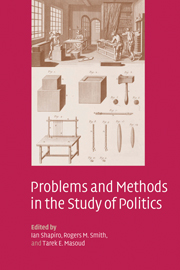Book contents
- Frontmatter
- Contents
- List of contributors
- Acknowledgments
- 1 Introduction: problems and methods in the study of politics
- Part I Description, explanation, and agency
- Part II Redeeming rational choice theory?
- 8 Lies, damned lies, and rational choice analyses
- 9 Problems and methods in political science: rational explanation and its limits
- 10 An analytic narrative approach to puzzles and problems
- 11 The methodical study of politics
- Part III Possibilities for pluralism and convergence
- Index
- References
10 - An analytic narrative approach to puzzles and problems
Published online by Cambridge University Press: 22 September 2009
- Frontmatter
- Contents
- List of contributors
- Acknowledgments
- 1 Introduction: problems and methods in the study of politics
- Part I Description, explanation, and agency
- Part II Redeeming rational choice theory?
- 8 Lies, damned lies, and rational choice analyses
- 9 Problems and methods in political science: rational explanation and its limits
- 10 An analytic narrative approach to puzzles and problems
- 11 The methodical study of politics
- Part III Possibilities for pluralism and convergence
- Index
- References
Summary
The false dichotomy between problem-oriented and method-driven work is belied by most of the best extant social science research. Occasionally, there may be research motivated only by the desire to improve a technique, but virtually all work of significant interest is trying to untangle a theoretical or empirical puzzle. Not all are puzzles of general public or contemporary interest, however, and this may be what generates much of the current concern about the “relevance” of contemporary social science. But this, too, is often an issue that is more apparent than real.
Many of the major topical questions, especially the Big Problems, are not easily susceptible to social science analysis. We can speculate and postulate and write op eds about how to end racism, poverty, or dictatorship and how to improve the well-being and voice of the neglected. We can seldom offer definitive solutions. Sometimes this is because the causes are distant and the outcomes cumulative and slow moving (Pierson 2003). Often it is because the problems themselves are inadequately specified and the information social scientists need for analysis unavailable or even unobtainable.
Despite these and other limitations, social scientists can inform public debate and policy. There are excellent examples of scholars who have, among them James Scott (1985, 1998) on the green revolution and on state actions, Frances Fox Piven and Richard Cloward (1977, 1993 [1971]) on welfare systems and other policies meant to aid the poor, Doug McAdam, Sidney Tarrow, and Charles Tilly, separately and together (2001) on contentious politics, Fritz Scharpf (1991, 1999) on governance and democracy in the new Europe, and David Laitin (1992, 1998) on language choice.
Information
- Type
- Chapter
- Information
- Problems and Methods in the Study of Politics , pp. 201 - 226Publisher: Cambridge University PressPrint publication year: 2004
References
Accessibility standard: Unknown
- 24
- Cited by
